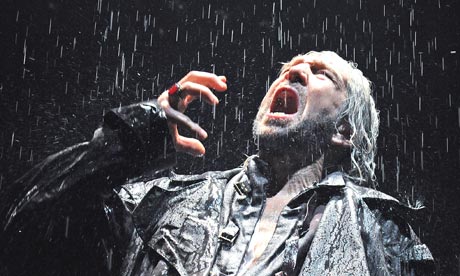 Although this play isn't overtly Christian, the characters do invoke the gods or the stars a lot, mostly to blame them for everything that's happening. This made me think about whether the misfortunes the characters face in Act III and IV, especially King Lear going mad and Gloucester getting his eyes gouged out, can be seen as some kind of divine justice or fate catching up with them for being bad fathers. In Gloucester's case especially, it does seem like fate is really playing with him, since he becomes literally blind after being so figuratively blind about his sons. King Lear going mad also has a feeling of divine justice about it, especially since the storm is what seems to be the last straw for him. He blames his daughters first and foremost for his madness, but his own guilt seems to play a part in it as well, as we see when he meets up with Cordelia again. Overall, the characters in this play face some pretty heavy consequences for their actions, some of them quite immediate, like Cornwall's death. Is this because of divine action or simply natural consequences?
Although this play isn't overtly Christian, the characters do invoke the gods or the stars a lot, mostly to blame them for everything that's happening. This made me think about whether the misfortunes the characters face in Act III and IV, especially King Lear going mad and Gloucester getting his eyes gouged out, can be seen as some kind of divine justice or fate catching up with them for being bad fathers. In Gloucester's case especially, it does seem like fate is really playing with him, since he becomes literally blind after being so figuratively blind about his sons. King Lear going mad also has a feeling of divine justice about it, especially since the storm is what seems to be the last straw for him. He blames his daughters first and foremost for his madness, but his own guilt seems to play a part in it as well, as we see when he meets up with Cordelia again. Overall, the characters in this play face some pretty heavy consequences for their actions, some of them quite immediate, like Cornwall's death. Is this because of divine action or simply natural consequences?Saturday, October 10, 2015
Sweet Justice
 Although this play isn't overtly Christian, the characters do invoke the gods or the stars a lot, mostly to blame them for everything that's happening. This made me think about whether the misfortunes the characters face in Act III and IV, especially King Lear going mad and Gloucester getting his eyes gouged out, can be seen as some kind of divine justice or fate catching up with them for being bad fathers. In Gloucester's case especially, it does seem like fate is really playing with him, since he becomes literally blind after being so figuratively blind about his sons. King Lear going mad also has a feeling of divine justice about it, especially since the storm is what seems to be the last straw for him. He blames his daughters first and foremost for his madness, but his own guilt seems to play a part in it as well, as we see when he meets up with Cordelia again. Overall, the characters in this play face some pretty heavy consequences for their actions, some of them quite immediate, like Cornwall's death. Is this because of divine action or simply natural consequences?
Although this play isn't overtly Christian, the characters do invoke the gods or the stars a lot, mostly to blame them for everything that's happening. This made me think about whether the misfortunes the characters face in Act III and IV, especially King Lear going mad and Gloucester getting his eyes gouged out, can be seen as some kind of divine justice or fate catching up with them for being bad fathers. In Gloucester's case especially, it does seem like fate is really playing with him, since he becomes literally blind after being so figuratively blind about his sons. King Lear going mad also has a feeling of divine justice about it, especially since the storm is what seems to be the last straw for him. He blames his daughters first and foremost for his madness, but his own guilt seems to play a part in it as well, as we see when he meets up with Cordelia again. Overall, the characters in this play face some pretty heavy consequences for their actions, some of them quite immediate, like Cornwall's death. Is this because of divine action or simply natural consequences?
Subscribe to:
Post Comments (Atom)
It's a good question. Being a play, everything does feel more orchestrated than it would if it was just natural consequence. I think that it could very well be divine justice but, if so, it would feel unfair to Gloucester who is gullible in trusting Edmund, but not deliberately sinful.
ReplyDeleteIn my post I talked about how Lear and Job are similar because they both go through a tremendous amount of suffering. Your question at the end is really interesting because it plays into the differences between Job and Lear. Job suffers from divine action, but it is to prove his faith. Lear could be suffering from divine action, but it is to punish him and enact justice on him.
ReplyDelete